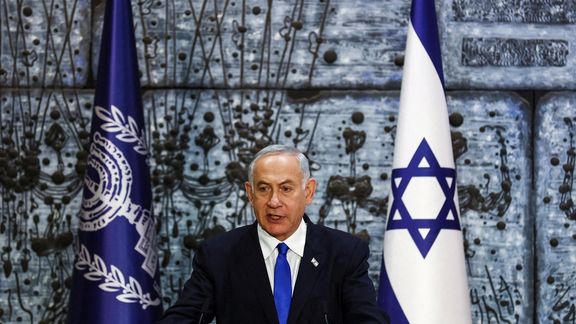Rejecting JCPOA, Netanyahu Rules Out A Peace Agreement With Iran

In an interview with al-Arabiya, Benjamin Netanyahu has reiterated opposition to the 2015 Iran nuclear deal and urged Saudi Arabia to ‘normalize’ with Israel.

In an interview with al-Arabiya, Benjamin Netanyahu has reiterated opposition to the 2015 Iran nuclear deal and urged Saudi Arabia to ‘normalize’ with Israel.
Netanyahu, who is working for a government with militant settler and Otzma Yehudit party leader Itamar Ben-Gvir as security minister, praised the Middle policies of former US President Donald Trump.
Israel’s US-sponsored 2020 ‘normalization’ agreement with the United Arab Emirates, Bahrain, Morocco and Sudan had broken with an “old groove” and the “same rabbit holes” represented by the 2002 Saudi-drafted Arab Peace Initiative (API), Netanyahu said. The API, which remains Arab League and Saudi policy, made recognition of Israel dependent on a viable Palestinian state in the Israeli-occupied West Bank and Gaza.
Netanyahu, however, urged the United States to reaffirm its commitment to Saudi Arabia and pledged to pursue formal Israeli ties with Riyadh for a "quantum leap" in peace.
"The traditional (US) alliance with Saudi Arabia and other countries, has to be reaffirmed. There should not be periodic swings, or even wild swings in this relationship, because I think that the alliance...is the anchor of stability in our region," he said.
‘Atomic arsenal paved with gold’
Netanyahu called the JCPOA (Joint Comprehensive Plan of Action), signed by world powers in 2015, a “horrible agreement because it allowed Iran basically with international approval, to develop a nuclear and basically an atomic arsenal paved with gold, with hundreds of billions of dollars of sanction relief.”
Before Trump withdrew the US from the JCPOA in 2018, the International Atomic Energy Agency had extensive inspection powers that it used to verify Tehran’s compliance with strict nuclear limits. Iran has since 2019 responded to US ‘maximum pressure’ sanctions by boosting the nuclear program far beyond JCPOA limits.
However, the JCPOA had sunset clauses that over time would end many restrictions imposed on Iran’s nuclear program.
Netanyahu made clear his opposition to any agreement with Iran. “Who cares what they sign? It doesn’t mean anything. They sign and they violate, they cheat as fast as they sign. And you certainly shouldn't make agreements with them that are bad if they keep the agreement, which is what I think the JCPOA was.”
But the development of the Iranian nuclear program since 2019 has left Israel with little choice, the prime minister designate said, while a change of mood in Washington with the current unrest in Iran had made JCPOA renewal less likely.
Lebanon maritime agreement ‘tactical’
“A lot of people now across the board in many lands say: ‘You really cannot go back to the JCPOA and we have to do everything in our power to stop Iran from having a nuclear arsenal.’” Israel was prepared to take military action, with or without US support, to stop the Iran nuclear program, Netanyahu insisted.
He also ruled out agreement with Iranian “proxies,” calling “tactical” the October 27 US-brokered maritime agreement with Lebanon that designated sea areas to enable offshore gas exploration. Hezbollah, the Iran-allied Shia party, ruled in Lebanon, Netanyahu insisted: “Let’s be open about that. But without Iranian support, they’d collapse overnight.”
Netanyahu, whose Likud Party famously in 2019 raised a banner of him with President Vladimir Putin on its Tel Aviv headquarters, defended Israel’s relationship with Russia, emphasizing the need for intelligence cooperation with both states flying jets in Syria. He said he would “look into” Ukraine’s request for weapons from Israel once he took office.